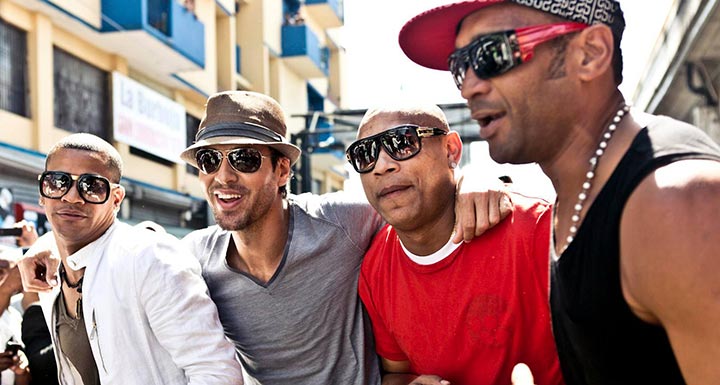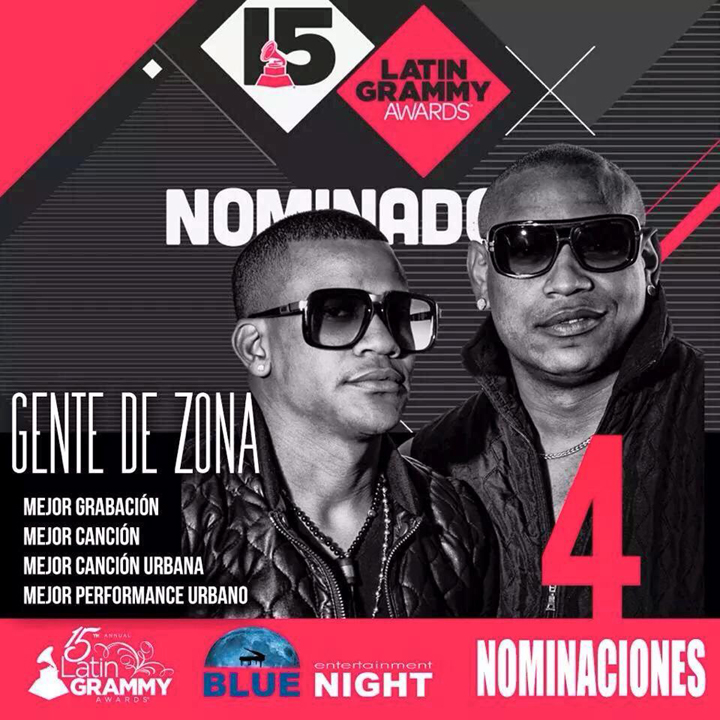
‘Bailando’ in Vegas and Gente de Zona for the world
MIAMI — Alexander Delgado and Randy Malcolm, members of Gente de Zona, have raised Cubans to one of the pinnacles of the musical world. On the night of Nov. 20, when the curtain opens in Las Vegas for the Grammy Latinos awards, the “Bailando” team will be in Paris, doing a series of presentations that have kept them in Europe.
Along with Enrique Iglesias and Descemer Bueno, they’ve garnered four nominations for “Bailando”: Song of the Year, Record of the Year, Best Urban Song and Best Urban Performance. Will they get an award?
These boys began to make music in Alamar, a neighborhood outside Havana. Top-notch “sandungueros,” they come to this Hall of Fame and applause on a global scale. But they don’t forget “where the singers are from.” A Progreso Weekly team talked with them recently.
 Randy Malcom: They called me at home at 7 a.m. and I couldn’t believe it. My eyes watered, even. I am super happy. It is not the first time that a Cuban group gets a Grammy — Van Van already have it, and so do Irakere — but no one from this musical generation, in which nobody believed. We’re going to make it happen, to make people understand that, as generations change, so does music.
Randy Malcom: They called me at home at 7 a.m. and I couldn’t believe it. My eyes watered, even. I am super happy. It is not the first time that a Cuban group gets a Grammy — Van Van already have it, and so do Irakere — but no one from this musical generation, in which nobody believed. We’re going to make it happen, to make people understand that, as generations change, so does music.
Alexander Delgado: I think it’s the best song GDZ has ever done, because it propels us to worldwide fame. And with none else than Enrique Iglesias, whom I’ve admired since I was a child.
RM: The song has had more than 500 million hits on YouTube. It’s the most popular Spanish-language song in the history of music — even more popular than “Macarena.”
ML: To the people of Cuba, these four nominations already represent an award. They are a recognition of your talent and perseverance. Will this new step in your careers make a change in GDZ’s projection?
AD: It does, in the sense that the group now has an international projection; it is among the most popular groups in urban music worldwide. In this case, we are entering the level of the world’s top-ranking artists. From now on, what we need to do is to continue to work and hold on to the rating we have reached.
ML: With this success, popularity, recognition, projection, do you feel any nostalgia for the previous Gente de Zona group, the one that was born and raised in Alamar, just as a project?
AD: That background helps you and gives you strength to go on working. Nostalgia is always there, because you’ll never forget where you were born, where you came from, where you created the group and with what objective. Someday, we’ll return to Alamar to give a concert.
When you speak of Alamar, you speak of Cuba. So far, we’ve stayed in Cuba. We continue to work, we continue to respect the public that first supported us. Everything comes from there and that’s where we’ll always return because that’s the place where we have our roots, where we triumphed, the place that brought us into the world.
RM: GDZ is not different, but something in it has changed. GDZ is a fusion of the urban genre of reggaeton and a way to make the music different. Today we do flamenco, salsa, timba, pop, reggae. It wasn’t that way before.
ML: You are now finishing your latest CD, produced by Blue Night Entertainment, a company with which you worked on the production of your recent concert at James L. Knight Center in Miami. Are the songs you performed at that concert included in the new musical production?
AD: Yes, I believe it’s a very diverse disk with great musical value and the presence of great artists. It’s titled “Yo quiero más” [I Want More] and it has several guest performers. We have Enrique Iglesias and Pitbull, Elvis Crespo, Chino and Nacho, Jeancarlos Canela, Maffio and Henry Santos, artists who some way or other have had worldwide success.
To us, it’s an honor to have made a disk like this one, in which so many artists participate. From this disk, we’ll pick a single like the one we’re releasing now, which is called “Yo quiero” [I Want] and includes Pitbull.
ML: Do you believe that this popularity, this opening to international collaboration also grants recognition to other Cuban artists, their talent and their chance to share stages with foreign performers?
AD: I think this opens the door to all Cuban artists. It is a bit unfair that the doors did not open earlier. We’re glad to be the ones who, with the help of Enrique and the other international artists like Descemer, did that.
RM: It was a matter of fear, more than anything else. I know that artists here and everywhere else in the world listen to Cuban music because they’re aware of the talent that exists in Cuba. Only today I was listening to “Que suenen los tambores,” which Laritza Bacallao did in a Victor Manuel arrangement. I think that’s the door. We knocked on it first, but everyone is invited. [LAUGHTER]
RM: We learned from a lot of people. I learned watching NG La Banda, Isaac Delgado and Irakere, Van Van. They’re institutions. But I daresay that this never happened before to top-level groups in Cuba. This is the moment and there’s no turning back. Everything begins now.
AD: To us, music has no frontiers. To me, the musicians here and the musicians there deserve to carry out this cultural exchange. Let it be real on both sides. We have the right to enjoy this exchange.






